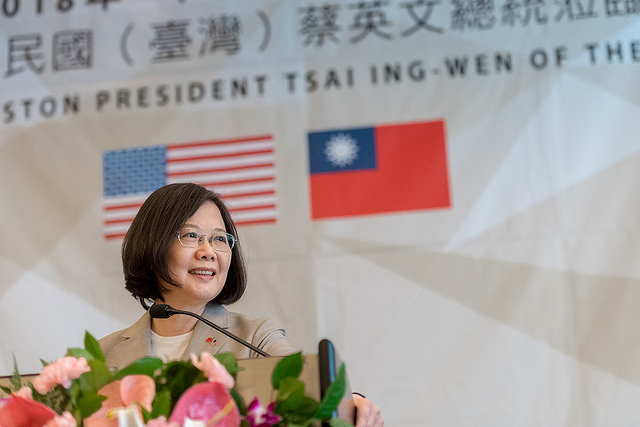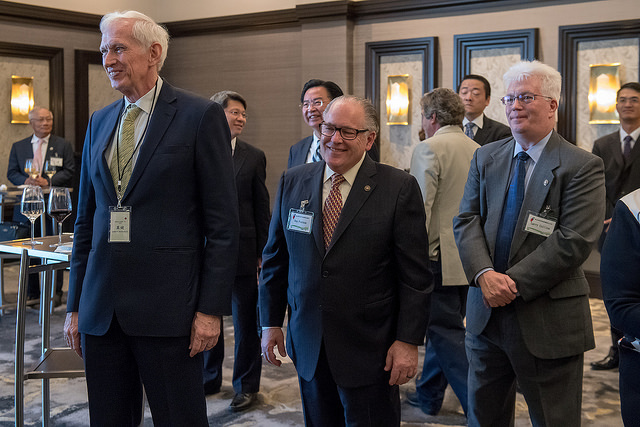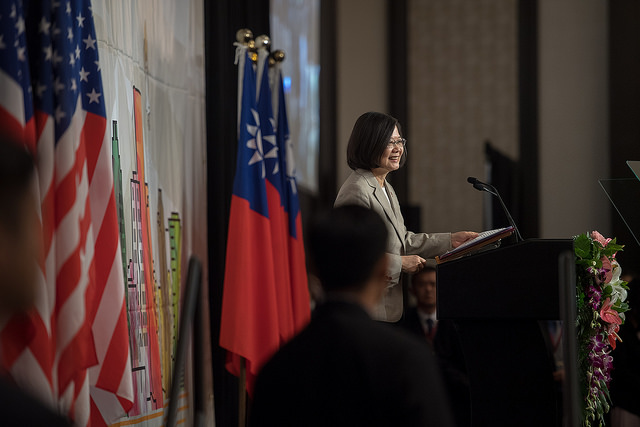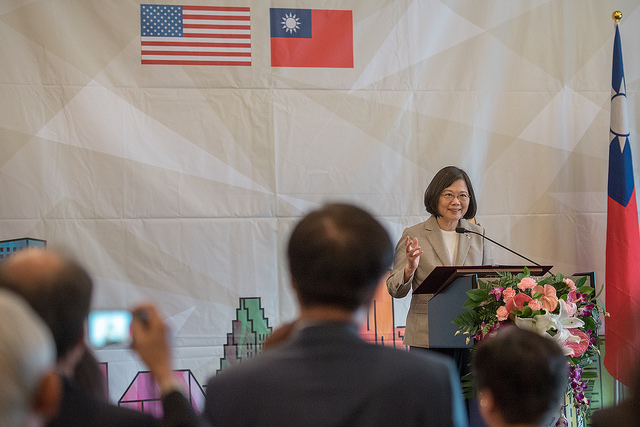News & activities
 News releases
News releases
While on her way back to Taiwan following state visits to Paraguay and Belize, President Tsai Ing-wen and her delegation made a transit stop in Houston, Texas. Their chartered aircraft arrived at George Bush Intercontinental Airport Houston on the afternoon of August 18 local time (early morning of August 19 Taipei time). ROC Representative to the United States Stanley Kao (高碩泰) and American Institute in Taiwan (AIT) Chairman James Moriarty boarded the plane to welcome the president, who subsequently proceeded to her hotel where she received an enthusiastic welcome from the overseas community.
During a dinner banquet for expatriates, President Tsai explained the government's reform achievements. She emphasized that she is guiding the reform process, and that she is as determined and confident as ever to lead her administration to transform Taiwan. So she asked all Taiwanese living abroad to work with the government to fight for Taiwan.
A transcript of the president's remarks follows:
Good evening Houston! I remember when I was here as a presidential candidate in 2015. We only had a four-hour stopover, but even then, at an elementary school near the airport, I could feel your enthusiasm and support. And so, as president, I have made my transits here a matter of priority. Thank you all for welcoming me so warmly.
Now before I begin my remarks to the Taiwanese-American community, I want to acknowledge some very special visitors, and say a few words in English.
We have two members of Congress with us tonight: Congresswoman Eddie Bernice Johnson, and Congressman Al Green. I must say you have a very good last name. They have been key pillars of support for Taiwan in the U.S. Congress. They have worked tirelessly to advocate for Taiwan's international participation and encourage stronger Taiwan-U.S. ties. Can we give them a big round of applause?
I also want to recognize State Representative Alma Allen, Louisiana Secretary of Economic Development Don Pierson, Mayor of Sugar Land Zoe Zimmerman and his wife Nancy, as well as many of the other dignitaries and city council members gathered here. Of course, I want to acknowledge another special guest, and many of you may know him well. He's someone who needs no introduction, but I still want to introduce and mention him because he is such a good friend of ours – Chairman Jim Moriarty at the AIT. Thank you all for coming.
Tonight, at this gathering for the Taiwanese-American community, I already feel a little closer to home. In this dinner of 1,000 people – the largest banquet we have ever held in Houston – we see a little bit of Taiwan, and a little bit of America. We see the ties of kinship and friendship that have brought our two countries together. We see the commercial linkages that have made Taiwan one of America's largest trading partners. And we see the shared values and sense of purpose that intertwine the fates of our two countries.
Indeed, during this trip, a young woman asked me a question in Los Angeles: What does it mean to be Taiwanese-American? I have thought about this quite a lot during my trip.
While there is no right or wrong answer to questions of self-identity, what I want to say is this: To be a Taiwanese-American is to be proud of your heritage and culture. It is to take the best of both countries: the perseverance of being a Taiwanese, and the ambitiousness of the American dream. It is to have the willingness to stand up for the common values of both our countries – democracy, freedom, and the belief in human dignity – as a matter of principle and pride.
Indeed, the closeness of our values is one of the reasons why Taiwanese-Americans have prospered across the United States. This is why, for example, Taiwanese-Americans have been so active in their communities and in support of politicians that share their ideals, like those of you seated with us today. And this is why Taiwanese-Americans have been so quick and willing to combat the growing voices of authoritarianism. They do so not only outside this hotel today, but around the world.
Taiwan and the United States have a shared commitment to freedom and democracy at a time of monumental change around the world. This relationship is standing stronger than ever. Examples of this range from the Trump administration's first arms sale to Taiwan to, thanks to our friends in Congress, the passage of the Taiwan Travel Act. It is demonstrated by the opening of the new AIT compound in June, and by the way our two countries cooperate in promoting public health, pushing for gender equality, and fighting transnational crime.
I know that through your efforts this relationship will remain strong. Even as Taiwan, and our citizens and private enterprises, face growing threats to our freedom of expression and way of life, we know that Taiwan-U.S. relations will continue to be that one bright spot we look towards. Thank you for keeping this light alive. And thank you all for coming today. I will now continue my remarks in Taiwanese and Mandarin if you don't mind.
Following are translations of the portions of President Tsai's speech delivered in Taiwanese and Mandarin:
The president mentioned that when she was on her transit stop in Houston in January last year, it was a really cold day, so she thought that not many people would show up to greet her. But when she got out of the car, the front of the hotel was packed with Taiwanese. She then shook their hands, one after another. The more hands she touched, the more she was moved. Although everyone's hands were cold, she could feel their passion and enthusiasm for Taiwan. Although it was a cold day, she was so touched that her heart was just glowing.
President Tsai stated that during her transit stop in Los Angeles, she talked about reforms and development, and gave the expatriate there a detailed update on her administration's achievements for Taiwan over the past two-plus years. Many people were quite touched by what they heard. It was the first time they had heard about many of Taiwan's achievements and ongoing transformations. So during this trip, the president had Secretary-General to the President Chen Chu (陳菊) stay in the United States. Secretary-General Chen visited many places to tell Taiwanese expatriates in person about progress going on in Taiwan. The president appreciated her efforts.
President Tsai said that our expatriates living abroad have to depend on media and the Internet to understand Taiwan. She was just right there to tell them face-to-face about what the government is doing, and its reform accomplishments.
The president stated that when she came to Houston last year, her administration had just took office less than one year. Reforms involve complex issues, and many tasks were just getting started, or were only at the halfway point. So a lot of people were concerned that maybe things were changing too slowly. But she told everyone then that if we move ahead steadily, we'll definitely see results. Now, over two years have passed, and we're already seeing the results of our reform and development policies.
President Tsai pointed out that the government is doing everything it can to improve the economy. And over the past two years, many economic indicators have moved in a positive direction. The numbers—including the economic growth rate, exports, and stock market indexes—all show the kind of performance we've rarely seen over the past decade. And those results compare favorably with other countries. Multinationals like Microsoft, Google, Amazon, IBM, and CISCO have all chosen to invest in Taiwan, or expand their Taiwan development plans. Also domestic Taiwanese corporations like TSMC and Winbond Electronics have decided to keep their roots in Taiwan, and set up factories in Tainan and Kaohsiung. Many international green energy firms have come to Taiwan to develop offshore wind power, generating expected investments worth NT$1 billion in Changhua County's green energy and offshore wind power industries. It's significant that so many domestic and foreign firms have decided to invest in Taiwan, because it shows that Taiwan is making progress, and has a promising future.
Pointing to a gradual economic recovery, the president said that the government has taken the lead in increasing salaries and encouraging companies to do the same. We will raise the minimum wage. So starting next January 1, the minimum monthly wage will be raised from NT$22,000, the so-called "22K", to NT$23,100. The increase of the minimum monthly wage is a start to improve Taiwan's low wage problem. We will also raise the minimum hourly wage to NT$150, an increase of over 7%. That will be an important wage increase for many people who work part-time, and the younger generation.
President Tsai believes that many reforms have to be approached one step at a time, making steady progress. And raising the minimum wage is the best example. As long as the direction is right, and there's a firm hand at the wheel, success is certain. Today, the "22k" minimum wage is a thing of the past, and the government's efforts to make that change were not in vain.
Commenting on social reforms, President Tsai pointed out that Taiwan needs a long-term care system and a childcare system, and that the government will move ahead one step at a time to set these up. In addition, the price of housing is so high that young people can't afford it, and the government has addressed the problem by launching large-scale social housing projects. In the future, rents for social housing will be partially subsidized by the government. Tax reforms will also reduce the tax burden for people in low- and middle-income brackets. Beginning next year, an individual earning less than NT$30,000 per month or NT$400,000 per year, for example, or a four-person household with an annual income of less than NT$1.23 million, will no longer have to pay income taxes. "This is a government that cares for the needs of the people," she said.
As for political reform, President Tsai said that a live-broadcast channel for legislative proceedings makes the legislature more transparent, a great progress for Taiwan's democracy. The government also lowered the referendum threshold, and passed a law promoting transitional justice and an act dealing with ill-gotten party assets. "So the elections at the end of this year will be the first elections in Taiwan untainted by party assets," she said. These reforms all represent great progress for Taiwan's democracy.
In closing, the president emphasized that Taiwan is changing, and changing for the better. She is guiding this process as determined and confident as ever, she said, and will continue to lead her team to transform Taiwan. So she asked all Taiwanese living abroad to believe in and work with the government to fight for Taiwan.
Also in attendance at the banquet were AIT Chairman James Moriarty; Taiwan's Secretary-General to the President Chen Chu; National Security Council Secretary-General David T. Lee (李大維); Minister of Foreign Affairs Joseph Wu (吳釗燮); Minister of the Overseas Community Affairs Council (OCAC) Wu Hsin-hsing (吳新興); Senior Advisor to the OCAC Minly Sung (宋明麗); ROC Representative to the United States Stanley Kao; and Legislators Hsiao Bi-Khim (蕭美琴), Lee Chun-Yi (李俊俋), Chen Yi-Chieh (陳怡潔), Tsai Shih-Ying (蔡適應), Chou Chun-Mi (周春米), and Lai Jui-Lung (賴瑞隆).












